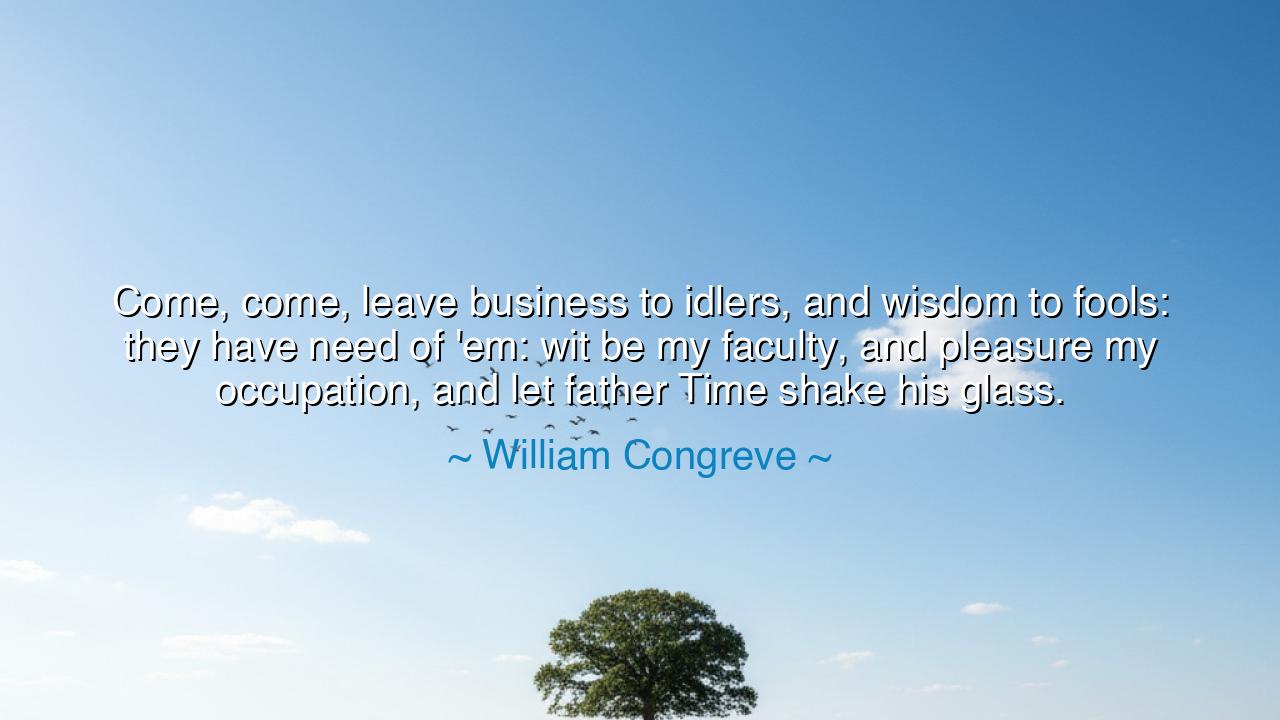
Come, come, leave business to idlers, and wisdom to fools: they
Come, come, leave business to idlers, and wisdom to fools: they have need of 'em: wit be my faculty, and pleasure my occupation, and let father Time shake his glass.






The words of William Congreve resound like a challenge flung against the vanity of the world. When he declares, “Come, come, leave business to idlers, and wisdom to fools,” he pierces the veil of false dignity men often place upon their toil and their hollow counsels. He speaks not to belittle labor or thought, but to remind us that both are easily corrupted—one by drudgery without purpose, the other by pride disguised as wisdom. In his voice we hear a cry of liberation: cast off the burdens imposed by custom, and embrace the nobler callings of wit and pleasure, which quicken the soul rather than enslave it.
Congreve’s vision is no idle jest, for he knew the stage of life to be brief, the sands in Father Time’s glass ever falling. The man who spends all his days chained to business may find, when the final grain drops, that he has lived only for the shadow of duty, never the substance of joy. Likewise, the one who parades his borrowed wisdom may discover he was but a fool, mistaking the trappings of philosophy for the light of truth. To live as Congreve counsels is not to squander time, but to adorn it with brilliance, laughter, and human delight.
Consider the tale of Alcibiades of Athens, pupil of Socrates, soldier, statesman, and lover of beauty. Though condemned by some as reckless, Alcibiades never bowed to the dull gods of routine or the hollow pretense of wise men who cloaked envy in austerity. He pursued glory with wit as his guide and pleasure as his companion, captivating allies and terrifying foes. Though his fate was turbulent, his flame burned brightly, and his memory endures when the cautious and “wise” of his age are dust forgotten. His life, like Congreve’s verse, teaches that boldness, not timidity, leaves its mark upon eternity.
Yet, let no one mistake Congreve’s call as mere hedonism. To choose pleasure as an occupation is not to wallow in vice, but to honor life as the gift it is. True pleasure arises from wit sharpened, friendship cherished, and beauty embraced. It is the courage to laugh when the world commands silence, to sing when others counsel resignation. The ancients spoke of eudaimonia—a flourishing of the soul—and this, too, is what Congreve suggests: that the highest wisdom is not in the calculations of fools, but in the art of living well.
And so, O reader, remember: let not the dust of ceaseless labor or the chains of hollow counsel rob you of your days. Take from Congreve’s words the lesson that time will not wait, that Father Time shakes his glass whether you rise to glory or sink into gray mediocrity. Choose, then, the path of vitality—let wit be your faculty, let pleasure be your crown, and live so that when the glass is emptied, you may say, not “I have endured,” but rather, “I have lived.”






BLBao Le
Reading this quote, I can’t help but reflect on how society often prioritizes productivity and seriousness, perhaps at the expense of pleasure and creativity. Is Congreve advocating for a philosophy of life that embraces spontaneity and enjoyment as essential human faculties? How might this outlook challenge contemporary norms about work, success, and the pursuit of knowledge? It makes me question whether modern life allows for the kind of wit-driven, pleasure-centered existence he describes.
HCLe Huu Cong
This perspective is both humorous and slightly rebellious, celebrating wit and enjoyment over traditional pursuits of wisdom and labor. I wonder, though, if there’s a cautionary note here—can a life devoted solely to pleasure and amusement become shallow or meaningless? Or does Congreve imply that cleverness and enjoyment are themselves a valid form of engagement with the world? It makes me curious about how historical contexts shaped such attitudes toward leisure and intellect.
NNNhung Nguyen
I’m struck by the playful defiance in this statement—it seems to invert the usual values of wisdom and diligence. But it also raises a question: is Congreve suggesting that wisdom and business are less relevant for someone who values wit and pleasure, or is he hinting at the folly of those who take themselves too seriously? Could adopting a lighter, more pleasure-oriented approach actually offer a different kind of understanding about life?
TNTran Ngoc
This quote feels both witty and provocative, as it seems to celebrate a life of pleasure and cleverness over serious business or conventional wisdom. It makes me wonder: is Congreve advocating for a kind of intentional idleness, or is he critiquing society’s obsession with productivity and self-importance? Can a life devoted to pleasure and wit actually lead to meaningful insight, or is it purely indulgent? How do we balance enjoyment with responsibility in modern life?